MSCA Correspondence Analysis: from individual mobility to leading networks and programmes
27/01/2026

The project coordination is one of the aspects that is very closely monitored and assessed in the context of the Framework Programmes (FPs). There is no doubt that the role of the coordinator is both complex and challenging. typically initiates a research project through mobilising a group of European scientists, industry and other relevant partners to develop a research based work programme over a number of months (and in some cases years) that will have beneficial impacts to stakeholders and realise wider impacts. When awarded the funding, the PC role then becomes focused on ensuring that the planned project is delivered successfully, and that each partner fulfils their planned activities on time, and within the allocated budget. Project collaborators can be drawn from other European countries, from different disciplines, and from different industry or organisational settings. This can result in unexpected challenges for PCs in leading and managing such research consortia [1]. For these and other reasons, the coordination of a project is a major success, especially in countries with a low level of research and innovation potential, which generally do not have such a strong background to lead and organise such large European projects.
The attentive reader will not have missed the fact that the long-term phenomena analysed in relation to the participation of the Czech Republic in the FPs were: the overall small number of Czech coordinators, their low activity and success rate. The latest published report on the Czech participation in Horizon 2020 states that "Czech coordinators coordinate a minimum of RIA and IA projects based on the cooperation of large international consortia..." [2, pp. 130, 136]. It is a good sign that current EC data related to the Horizon Europe programme suggest that the situation for Czech universities and colleges in relation to the coordination of research and innovation actions in the FP could be changing in a conclusive way. Let us remind you that Research and Innovation Actions (RIA) are projects based on the collaboration of research teams in international consortia funding research activities in the pre-commercial phase. They allow the exploration of new technologies, new methods, new products or improvements to existing products.
The institutions from the Czech Republic coordinated only 7 RIA projects in the last Horizon 2020 Framework Programme (this number does not include 2 projects coordinated in the Euratom Complementary Programme and 4 JTI - RIA projects, which are of a specific nature). Only 4 RIA projects were managed by Czech universities. In the current Horizon Europe programme (which has been running for less than two years), 11 RIA projects have already been led by Czech institutions. Of these 11 projects, 8 are coordinated by Czech HEIs and universities, which have become the dominant type of institution managing European projects of this type in the Czech Republic. Figure 1 documents the position of Czech HEIs and universities in Horizon 2020 (upper part of the graph) and Horizon Europe (lower part of the graph) in international comparison in terms of the number of successfully coordinated RIA projects. A comparison of both parts of the graph shows an improvement in the position of Czech HEIs among EU countries. Czech HEIs and universities have not only doubled the number of successfully coordinated projects in Horizon Europe compared to Horizon 2020, but the number of coordinated projects is comparable to Finland and the Czech Republic is even ahead of Austria. The Czech Republic currently dominates the Horizon Europe programme among the EU-13 countries.
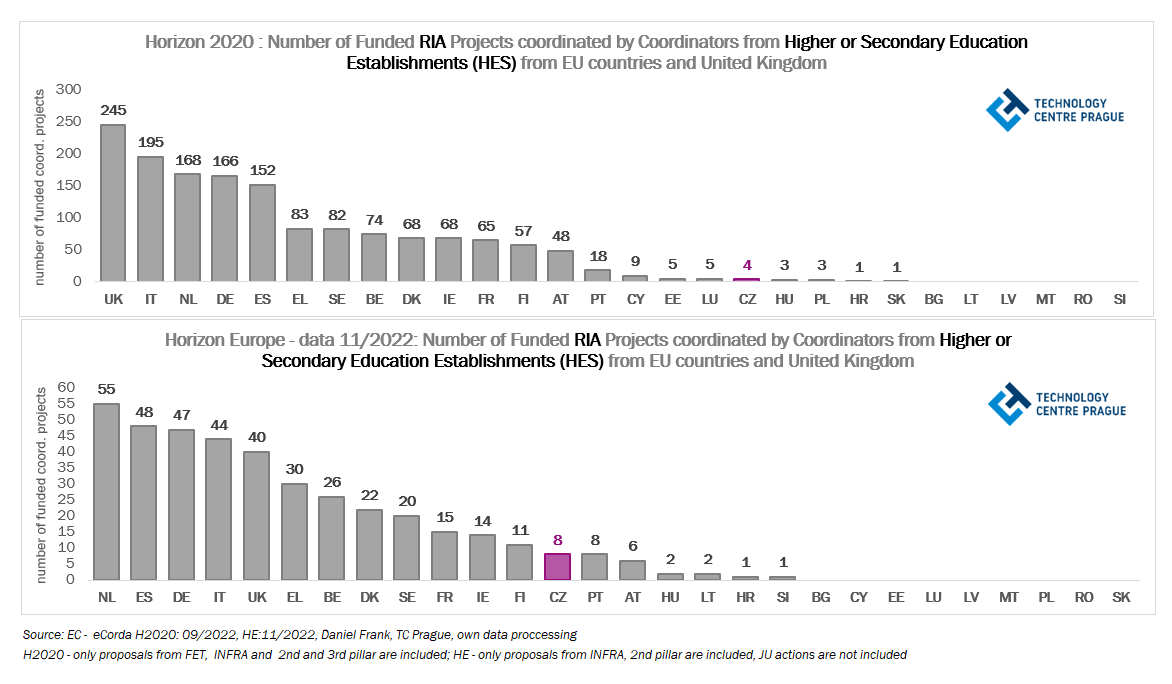
Figure 1: Number of Funded RIA Projects coordinated by Coordinators from Higher or Secondary Education Establishments (HES) from EU countries and United Kingdom
The increased activity of Czech HEIs and universities as submitters of research and innovation projects can be seen in Figure 2. The upper part of the graph presents the recalculated number of RIA project proposals submitted by universities and HEIs from EU Member States (and the UK) to Horizon 2020 calls. The lower part of the graph shows the same, but for Horizon Europe. While in H2020 the Czech Republic or Czech HEIs were ranked 23rd among EU countries in this indicator, in Horizon Europe the Czech Republic is ranked 16th among the compared European countries.
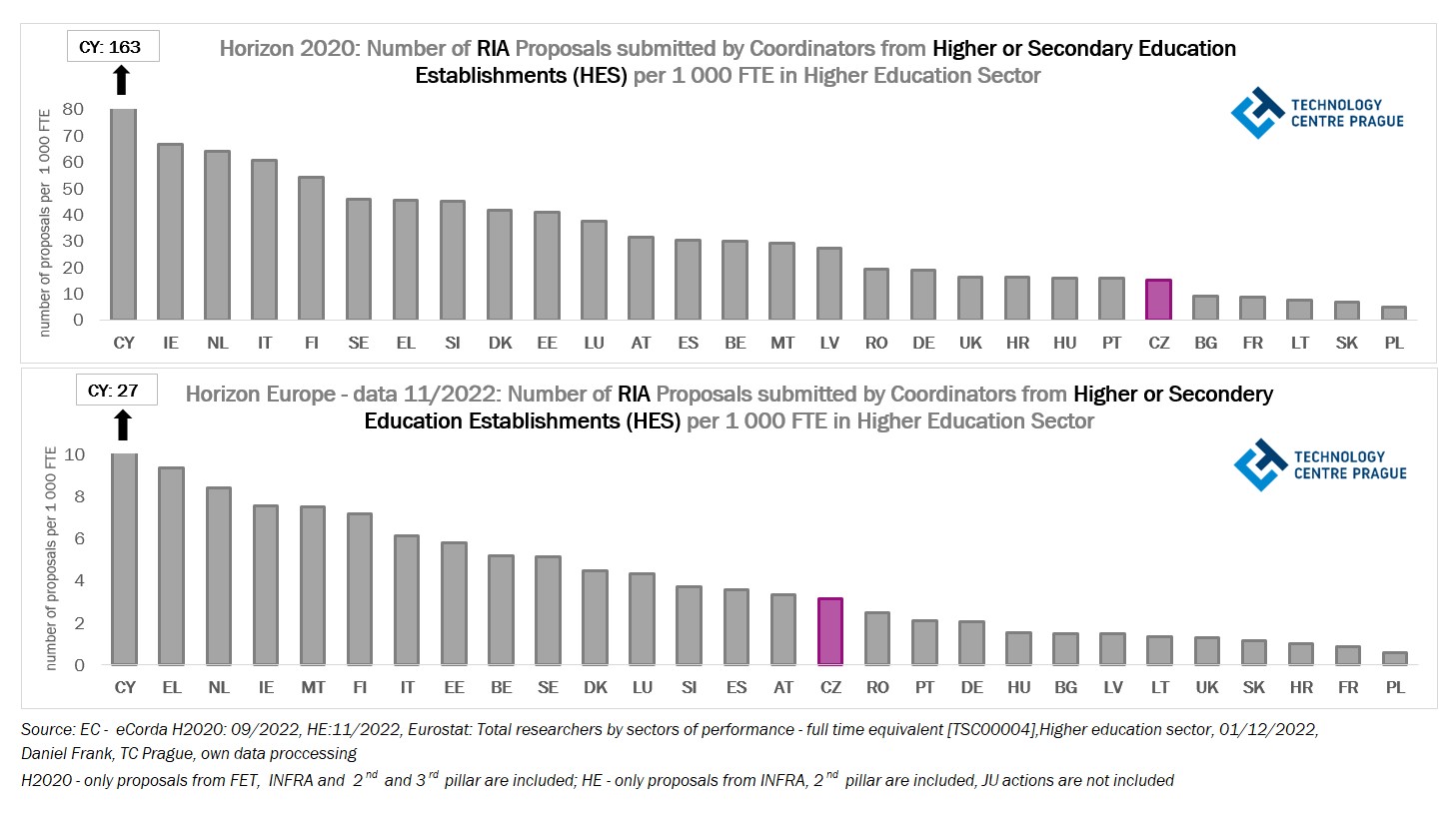
Figure 2: Number of RIA Proposals submitted by Coordinators from Higher or Secondary Education Establishments (HES) per 1 000 FTE in Higher Education Sector.
The relatively high number of funded and implemented RIA projects led by Czech HEIs and universities in the first third of Horizon Europe is also reflected in the relatively high success rate of Czech coordinators from the HES sector. The success rate of Czech HEIs and universities is comparable to many major European countries or their institutions from the university sector. The better position of Lithuania and Croatia compared to the Czech Republic is somewhat misleading in this case, as the university institutions of these countries submitted a very small number of project proposals (less than 10) to the Horizon Europe calls. This is true for most EU-13 countries (see supplementary table under Figure 3). To illustrate the relatively high success rate of Czech HEIs and universities, it is worth adding that e.g. Austria submitted only 8 more project proposals to Horizon Europe calls than the Czech Republic (i.e. 52), but only 6 of them were successful.
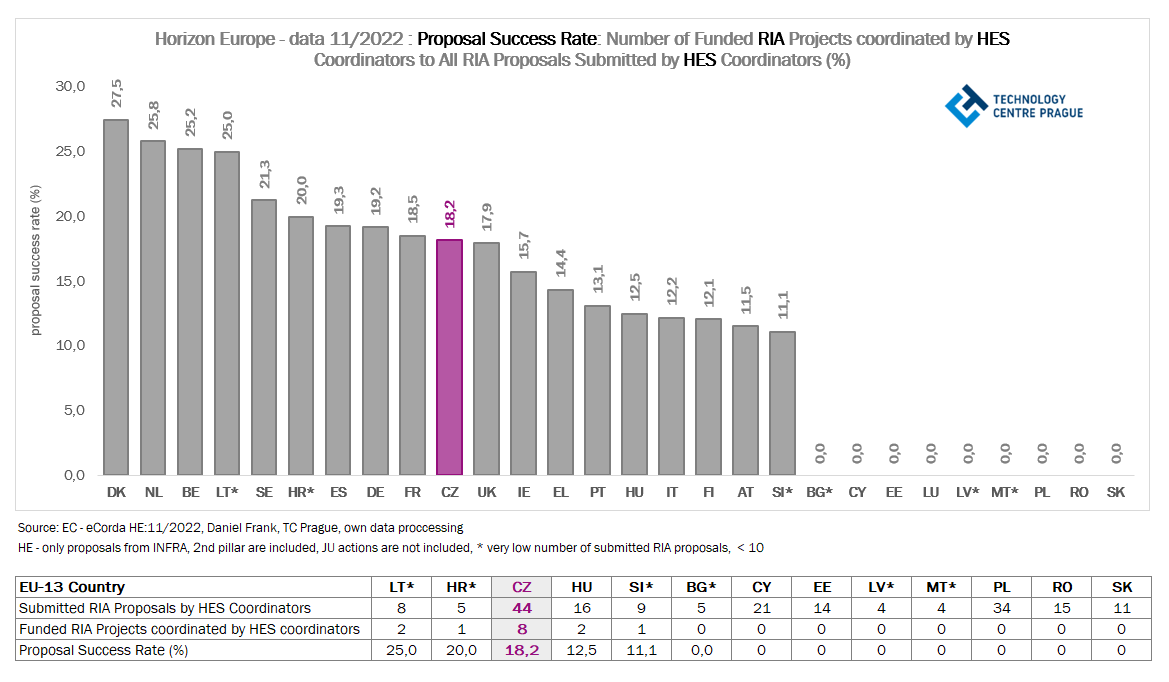 Figure 3: Success Rate of RIA Proposals submitted by HES Coordinators from EU countries and United Kingdom
Figure 3: Success Rate of RIA Proposals submitted by HES Coordinators from EU countries and United Kingdom
The performance of Czech universities and universities in the first third of the Horizon Europe programme in the role of coordinators of research and innovation projects can be considered a successful. However, there is always space for improvement. According to the results in Table 1, we can consider as optimal (if we disregard the hardly achievable 100% success rate) a situation where at least 25% of RIA project proposals submitted by Czech HEI coordinators would be classified as MAIN or RESERVE, at most 39% of project proposals as NO MONEY and at most 29% of project proposals as REJECTED. It goes without saying that coordinators from the Czech Republic should not submit INELIGIBLE project proposals. The Czech Republic would be at the level of developed European countries with these and better results. (Author's note: Project proposals flagged as MAIN, RESERVE and NO MONEY are generally classified as "above threshold - high quality project proposals". MAIN and some RESERVE project proposals are generally project proposals that receive funding from the FP budget.)
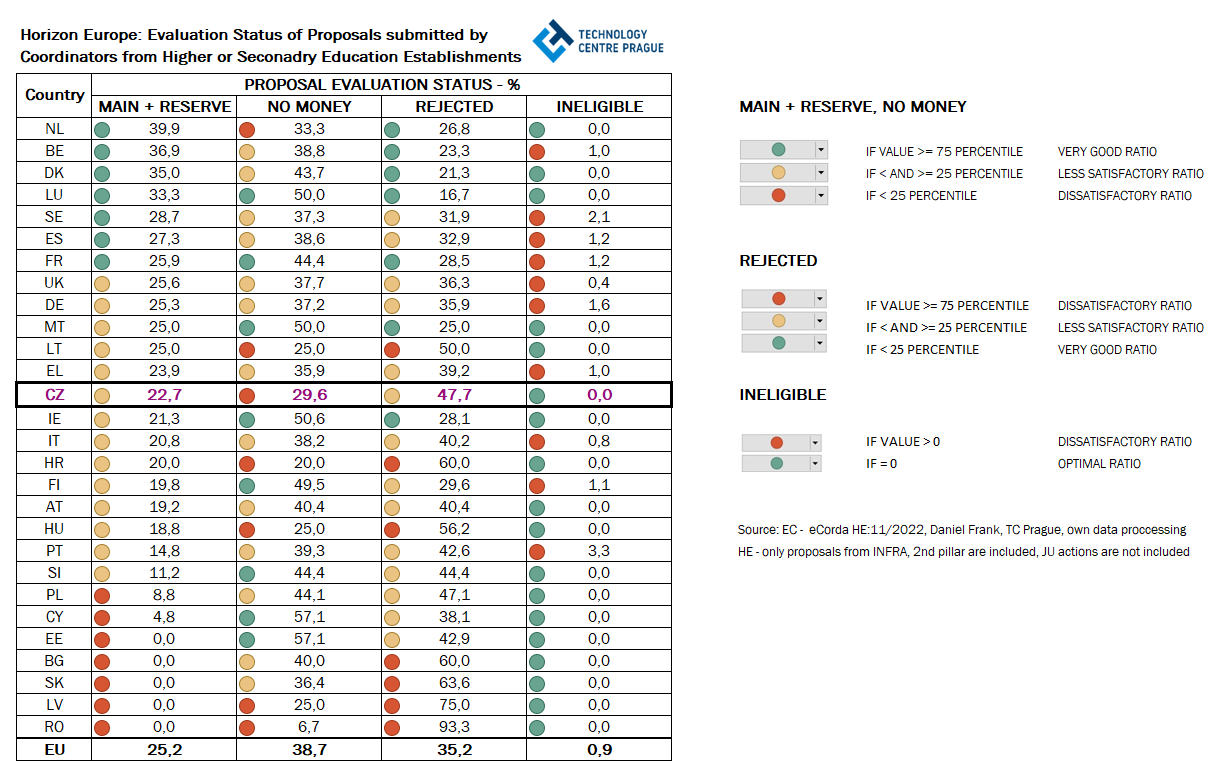
Table 1: Evaluation of RIA project proposals submitted by coordinators from HEIs (or lower level schools) and universities from EU countries (and the UK) to Horizon Europe calls
At the end of this short analysis, we list all Czech RIA project coordinators in Horizon Europe. Czech coordinators from other types of institutions are also listed in Table 2 for completeness. TC Prague can take satisfaction from the fact that half of these coordinators have used one of the advisory and consultancy services offered by TC Prague to Czech coordinators during the preparation of their projects. For the sake of interest, the ECO-READY project (with a budget of nearly € 14 million) is one of the largest projects coordinated by a Czech institution in the FPs.
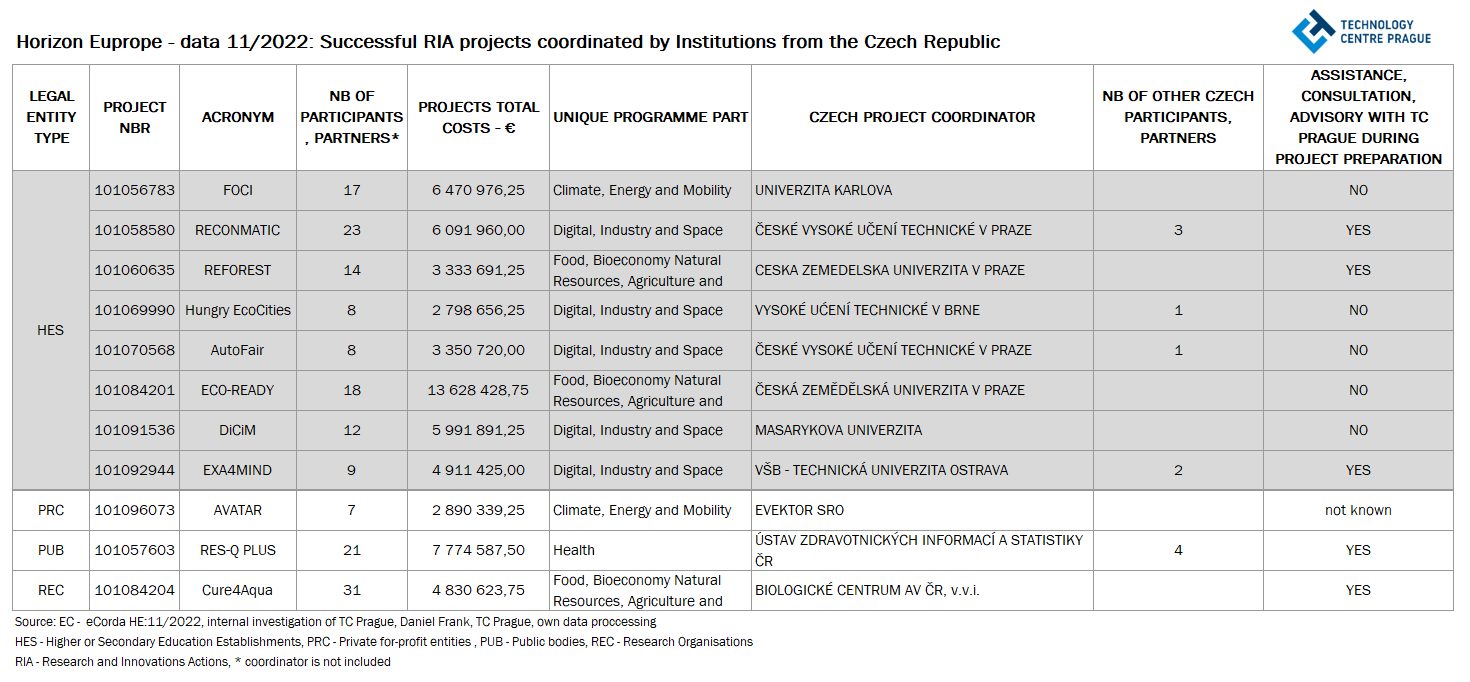
Table 2: Overview of successful RIA projects coordinated by Czech Institutions
It is questionable whether the current positive situation related to the coordination of European RIA projects at Czech HEIs and universities is the result of a combination of favourable circumstances - e.g. the composition of the topics in which Czech HEIs and universities have been successful or whether it is the beginning of a new and more positive trend, in which all the tools and mechanisms at institutional and national level that contribute to these good results are being capitalized. It cannot be overlooked that any support to research teams would be useless without the excellent content and idea of the project proposal, which is largely the responsibility of its coordinator.
Author: Daniel Frank, TC Prague, frank@tc.cz
References:
[1] Cunningham, J. A., O’Reilly, P., Hooper, D., Nepelski, D. and Van Roy, V., (2020). The Role of Project
Coordinators in European Commission Framework Programme Projects. Results of the Innovation Radar PC Survey in FP R&I Projects, EUR 30131 EN, Publications Office of the European Union, Luxembourg ISBN 978-92-76-17304-5, doi:10.2760/709126, JRC120015
[2] Frank, D., Vaněček, J.: Účast ČR v programu Horizont 2020 a v programu Euratom 2014 – 2020, 7. zpráva k červnu 2021, Technologické centrum AV ČR, příloha Echo 3-4/2021 | Časopisy. [online]. Copyright © Technologické centrum Praha [cit. 12.12.2022]. Dostupné z: https://www.tc.cz/cs/publikace/periodika/seznam-periodik/echo/echo-3-4-2021
27/01/2026
22/12/2025
02/12/2025